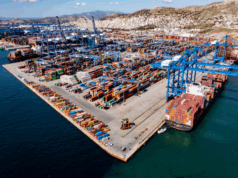Joint Declaration shows how Europe can lead the way in technology development and maritime excellence.
New data show that the cruise industry generates significant economic impact to European economies – Greece at the front line
Cruise lines, shipyards and marine equipment manufacturers have issued a Joint Declaration calling on the European Commission and European governments to include cruise ship building and the maritime technology sector in the forthcoming Net Zero Industry Act.
The Joint Declaration, announced at CLIA’s 2023 European Summit hosted in Paris from 8 to 10 March, calls for:
- faster access to funding for sustainable shipbuilding and maritime equipment manufacturing to support Europe’s world-leading position in this sector.
- expansion of support and incentives for retrofit programmes and deployment of renewable energy for maritime.
- a dedicated maritime programme as part of the EU Pact for Skills so that digital, green, and technical skills stay in Europe.
- maritime to be placed at the heart of the EU digital strategy to enable knowledge-share of the sector’s advanced digitalization practices.
Launching the Joint Declaration, CLIA Chairman, Mr Pierfrancesco Vago said:
“Cruise lines don’t just provide one of the most popular holiday options for consumers today, but they are also already partnering with shipyards and maritime technology providers to achieve net zero cruising by 2050. Pilot projects are underway to test new fuels and propulsion solutions such as batteries, fuel cell technology, advanced biofuels, and synthetic fuels. It is now time for European policy makers and governments to partner with the maritime technology sector. Europe has an opportunity to lead the way in technology development and maritime excellence for the benefit of future generations.”
“The building of cruise ships and the integration of advanced equipment and technology onboard such ships is very complex and illustrates the maritime industrial capabilities and know-how of Europe’s shipyards and maritime equipment industry. These capabilities and know-how will not only be crucial to achieve the European Green Deal objectives but also to enable Europe to meet other political objectives such as in terms of defence, blue economy, or energy transition, as well as to safeguard Europe’s maritime strategic autonomy” underlined René Berkvens, SEA Europe’s Chairman.
With its Fit for 55 package and now the Green Deal Industrial Plan, Europe is on a clear and ambitious path to combat climate change and become a carbon neutral continent. The SeaEurope and CLIA members started charting a course in this direction several years ago, producing more energy-efficient vessels, using new types of fuels, and equipping vessels with shoreside electricity connection. As the industry looks to the future, CLIA and Sea Europe remain fully committed to the EU long-term objectives.
Powering Europe’s green industrial revolution
The cruise industry generates significant economic impact to European economies. More than 93% of the world’s ocean-going cruise lines are built in European shipyards, and cruise ship building represents around 80% of the order book of shipyards. With 62 cruise ships on order for the next five years, this represents more than €40 billion direct investment in Europe.
According to new CLIA data, released during the CLIA Summit in Paris, the cruise sector generated €41bn economic impact in Europe during 2021 despite drastically reduced passenger volumes due to pandemic restrictions. The sector also supported 315,000 jobs in Europe during this challenging time. The strength of the European shipbuilding sector and its ties with the global cruise industry was key to maintaining robust levels of social and economic impact in Europe.
Greece at the front line
Greece enjoyed an increase on economic impact in 2021 even during the pandemic, as for the first time the country achieved an economic impact greater than €1 billion (€1.1bn), compared to €957 million during 2019. This came as a result of the country’s leading role in the fast and safe resumption of cruising, as well as the significant increase of home porting in Greece, which brings major economic benefits, through increased demand for cruise passenger accommodation, air travel, fuel, ship maintenance and supply services. This increase is also due to the stay of cruise ships in Greek ports for technical works. In addition, according to latest CLIA data, more than 15,100 jobs were supported in 2021 in Greece by the cruise industry.
Maria Deligianni, CLIA’s Director in the Eastern Mediterranean, said: “Greece’s proactive stance in safely and promptly restarting cruises during the pandemic has clearly brought the country to the front line internationally and gives a significant opportunity to optimize its position on the global cruise map. Now is the opportunity for Greece to further develop cruising and home porting activities, as long as the investments in port infrastructure and the coordination of activities at destinations continue, so that the development takes place in a sustainable way.”
Cruise continues to be one of the fastest-growing sectors of tourism and is on track to return to (and likely surpass) 2019 levels with potential passenger volume of 27 million to 33 million ocean-going guests globally in 2023, compared to 29.7 million in 2019.












